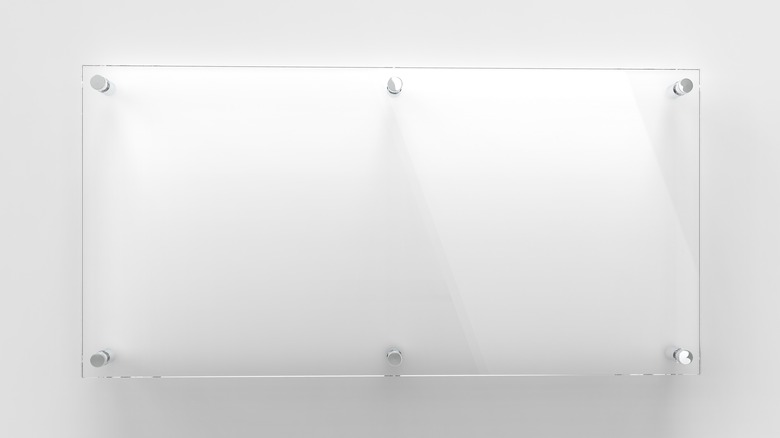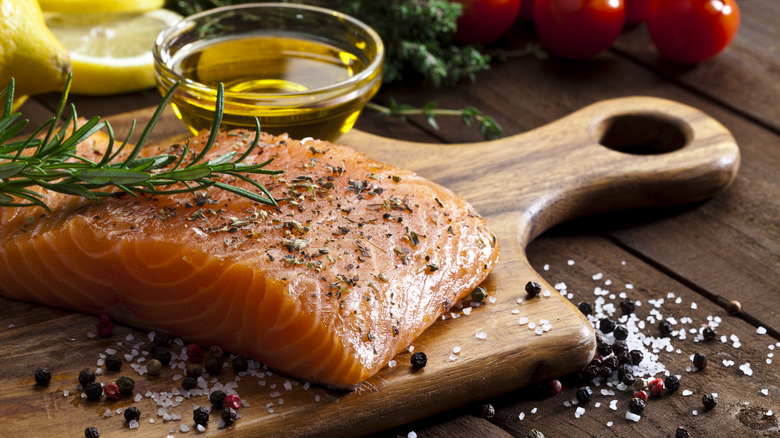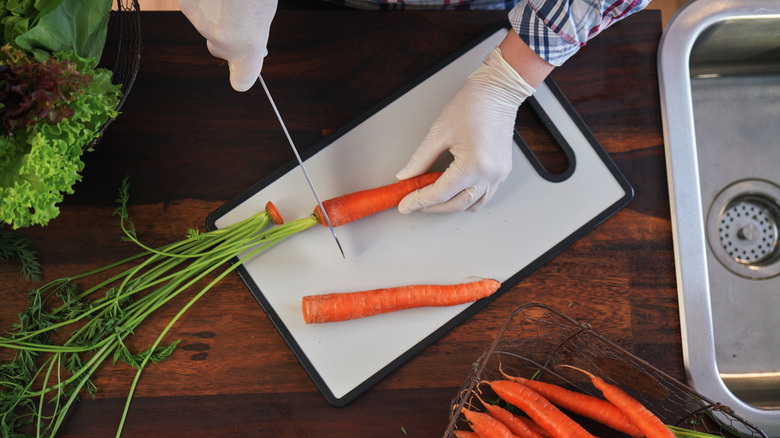Why You Should Think Twice Before Using A Glass Cutting Board
When shopping for a new cutting board, you have countless different materials to choose from: wood, bamboo, plastic, ceramic, rubber, and even glass. You might be drawn to the idea of glass cutting boards, as they look elegant, sound fancy, and glass has a reputation for lasting a long time, but this material can actually prove to be dangerous.
Glass cutting boards should be avoided due to their propensity to damage knife blades. Each time you draw a knife across a hard surface like glass, you dull its blade, making it less efficient. A dull knife is more likely to slip while cutting, especially if you press down on it hard to force the blade through tougher foods. Adding to this issue, glass is a very smooth surface, so any food you're trying to cut will likely slip around and raise the risk of injury. Our culinary school towel trick for holding a cutting board steady will only help so much.
Besides dulling your knife or injuring yourself, you can also damage the glass board itself. Using too much force or even setting it down too hard could chip the material, leaving you with shards on the counter, on the floor, or in your food. Needless to say, dropping a glass cutting board would be game over for your meal. As for what material to seek out instead, the answer can be complicated.
Other cutting board materials have their downsides, too
Though glass may be one of the worst cutting board materials, it isn't the only one you should steer clear of. Avoid cutting boards made from ceramic or hard stones like granite and marble. Just like glass, these materials comes in a variety of appealing colors and finishes, but they can dull your knife blades and cause food to slip around dangerously. Another cutting board material that has a few downsides is wood.
Wooden cutting boards are a great option for longevity and keeping knives sharp, but they require a level of care that not every home cook is prepared for. Wood is a porous material, meaning it can absorb various liquids and smells from food over time. To prevent bacterial growth and protect the surface, you need to regularly clean wooden cutting boards with mineral oil (no, cooking oil doesn't work). They're a solid and popular choice, but if you're the type of cook who prefers to throw everything in the dishwasher, they might not be for you.
Similarly, plastic cutting boards can prove frustrating to maintain, due to their tendency to absorb smells and colors from food. You'll find yourself having to clean stains and scuffs frequently, and not everyone has time for that. Most plastic boards also lack enough heft or grip to stay in place during use, and can easily be damaged by knives, forming grooves or slashes on the surface.
What kinds of cutting boards should you actually buy?
You might think the best cutting boards are hard and therefore durable, but softer materials are actually the most effective and safe, while still being sturdy. The best type of cutting board to keep your knives sharp is heavy-duty rubber. Rubber is gentle on your blades, while also keeping food (and the board itself) in place with its "grippy" qualities. Rubber is also impermeable to bacteria, making these boards a safer option to use with foods like raw meat. Of course, higher quality comes with a higher price — the best rubber boards can cost $100 or more.
A more budget-friendly alternative to a rubber board (particularly if you're looking for something low-maintenance) is plastic boards with a silicone grip on the bottom. Like rubber, plastic provides an easy-to-clean antimicrobial surface, and a grippy layer makes the board safer to use. Keep in mind that plastic cutting boards are prone to warping, staining, and other superficial damage, so you'll need to replace them more frequently, but they're still a solid budget option.
The third best option for a cutting board is wood, despite its long list of care instructions. Most of these boards are heavy enough to stay in place, they're not too harsh on your knives, and any minor damage can be sanded down. Be sure to choose softer woods, though, as hard woods can dull your knives as easily as glass can.



